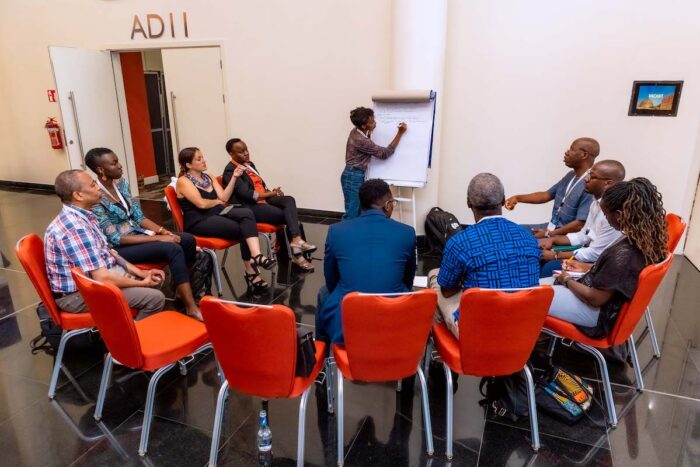This is the second part of a series of articles that are providing recap of the recently concluded Africa AI Conference held in Kigali in June 2023. In the first part, we broke down the objectives of the conference shared through the powerful keynote address by Nnenna Nwakanma that was centered on the significance of understanding the why behind AI development and the importance of approaching it responsibly.
Through this series of articles, we will provide a recap of the conference by focusing on the four themes that the workshops and presentations could be classified under, that is – AI Research and Applications, AI Adoption and Commercialisation, AI Skills and AI Governance and Policy.
In this article, we will take a look at AI Adoption and Commercialization
AI Adoption and Commercialisation
Artificial Intelligence8 (AI) has the potential to transform societies and drive sustainable development across the globe. In Africa, the adoption and commercialization of AI solutions hold promise for addressing pressing challenges and unlocking new opportunities. However, achieving AI capacity, adoption, and commercialization in the region comes with its own set of obstacles.
From building AI capacity and challenges of AI adoption to technology transfer and commercialisation, we delve into the insights and recommendations offered by experts, policymakers, and scholars.
Capacity Building in AI: Challenges and Opportunities
Building AI capacity in Africa is critical to fostering innovation and driving progress. However, several challenges were highlighted during the discussions. A shortage of skilled AI professionals remains a significant barrier, along with the limited availability of AI programs in universities. Retaining talent poses an additional challenge, as limited competitive markets may lead to brain drain. Moreover, the perceived complexity of AI, especially involving mathematics, discourages students from pursuing AI-related careers.
The lack of computing devices and reliable infrastructure also impedes AI capacity development. Training AI models require significant computing resources, and traditional procurement procedures can be time-consuming. Cloud services were proposed as a potential solution, but subscription costs and reliable internet connectivity remain issues.
Access to crucial and reliable data is another major challenge. The fragmented and insufficient nature of available data hampers the development of effective AI models. To overcome these challenges, supporting institutions in addressing data set challenges, establishing AI programs in African universities, and exploring hybrid solutions combining on-premises infrastructure and the cloud were proposed.
Challenges of AI Adoption in Africa: Case Studies from South Africa and Rwanda
The adoption of AI technologies in Africa was explored through case studies from South Africa and Rwanda. The session aimed to identify progress, challenges, and policy implications associated with AI implementation in the continent.
Joris Cyizere discussed challenges related to the industrial revolutions in Africa and the need to clarify the meaning of AI in the African context. He highlighted the private sector’s growing role in AI technologies and emphasized the importance of collaborative efforts among African countries to define AI’s significance and explore potential applications.
Dr Ntsibane Ntlatlapa presented on the policy position in South Africa, highlighting the development of AI institutions and research hubs in the country. He emphasized the need for technology to solve problems and outlined the approach of C4IR South Africa, including defining indicators, data analysis, policy framework development, and test/pilot initiatives.

Collaborative efforts among African countries were emphasized to define AI’s significance and explore potential applications. Stakeholders from government, academia, industry, and civil society participated in interactive sessions to foster an inclusive AI ecosystem.
Technology Transfer and Commercialization: Challenges and Opportunities
The Technology Transfer and Commercialization session, led by the African Center for Technology Studies (ACTS), shed light on the accomplishments, challenges, and opportunities in technology transfer and commercialization in Africa. Bridging the gap between academic research and deployment was identified as crucial, with an emphasis on multidisciplinary solutions and tenacity.
Funding, collaboration, infrastructure development, skills enhancement, and visibility through social media and media partnerships were highlighted as essential components for successful technology transfer and commercialization. The AI4D Africa Scholarship program was recognized for its positive impact in supporting PhD scholars and funding projects in various sectors.
Commercialization of AI Solutions: Focus on Health in Africa
The session on the commercialization of AI for health in Africa underscored the efforts of Vilgro Africa, a health-focused company. Their incubation program for health startups, offering financial support and assistance, was praised for its positive impact. Trust in AI data, data-gathering processes, and infrastructure were identified as key issues.
The challenges of business models in low- and middle-income countries, intellectual property development, and data coordination were also discussed. Participants raised concerns about the sustainability of open-source data for startups and the need to protect African data and intellectual property.
Conclusion
AI capacity, adoption, and commercialization are essential for driving sustainable development and economic growth in Africa. The workshops and sessions highlighted the challenges and opportunities in these areas. Building AI capacity requires addressing talent shortages, enhancing infrastructure, and improving data availability. Challenges in AI adoption include clarifying the meaning of AI, promoting collaboration, and developing policy frameworks.
Successful technology transfer and commercialization depend on funding, collaboration, visibility, and bridging the gap between academia and deployment. For commercializing AI solutions, open-source models, collaboration, and market value proposition are key. Overall, the insights and recommendations provided valuable strategies for harnessing the potential of AI in Africa to shape a brighter future for the continent.